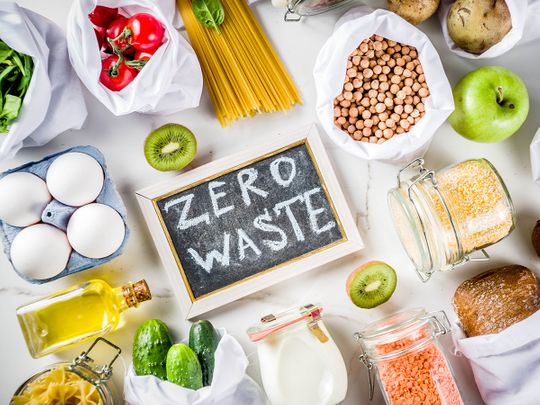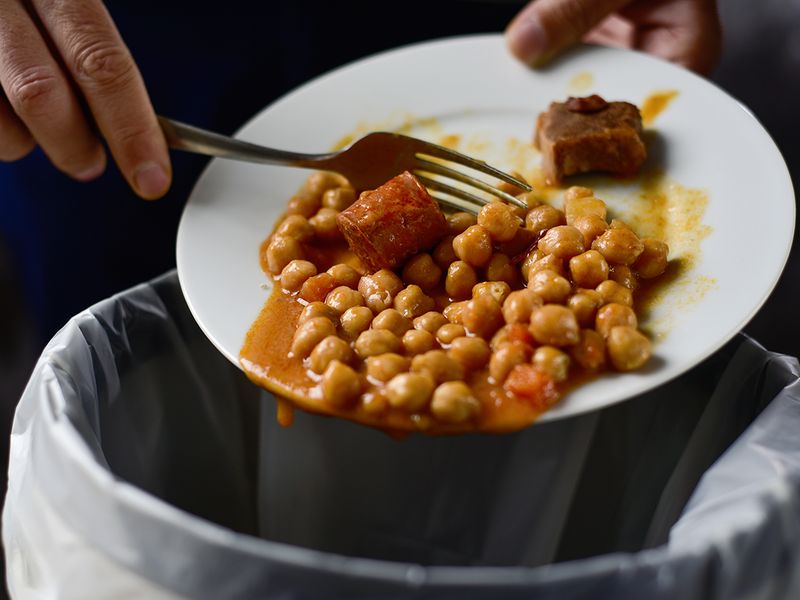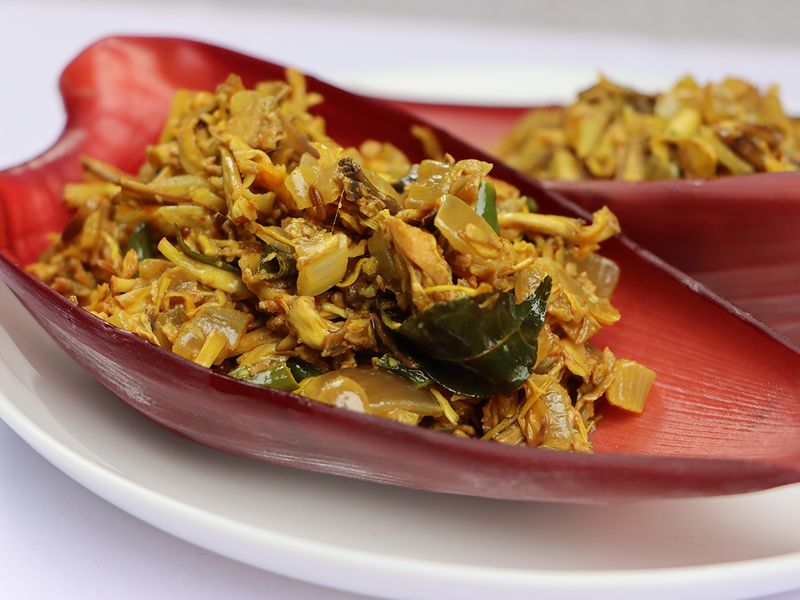Indian Slow Cooking Technique Crossword

"Don't throw it away!" exclaimed my mother as I prepared to discard the peel of my banana. "It shouldn't go in the bin, it has a better use."
Growing up in an Indian home, my parents have always taught me a thing or two about saving. Especially since everything in our house served a purpose. Whether it was electricity, water, a t-shirt, a plastic bag, or even a glass jam bottle, nothing was wasted until broken, rotten, torn or lost. And that rarely ever happened.
However, why a peel? I wondered.
I soon found the answer to my question, and I realised that there's more to a peel, a seed, or even an herb. It does more for us than we ever give it credit. Times have changed, and we all live in a world that is battling food wastage and shortage among other issues.
Food wastage primarily occurs due to poor meal planning, where we buy and cook too much food, not eating leftovers and discarding what is left in our pantry, refrigerators and freezers.
According to the global Food Waste Index Report of 2021, a staggering 50 kilograms of food is thrown away per person every year in Indian homes alone. To make matters worse, India is second in line for discarding food annually, with a whopping 68.8 million tonnes.
If these statistics scare you, then you would also be relieved to know that India has also been one of the pioneers of zero food waste, which means using your food for a purpose until the very last crumb or grain. This concept was practised over several years; however, it emerged to its highest potential when the pandemic struck in 2020.
People had opted for sustainable practices, which meant they had to reuse, recycle and reduce wastage in their little way. Going out to shop for fresh vegetables was a long shot, considering restrictions and lockdowns. Reduced garbage collection also meant don't waste everything in one go.
Of late, this concept has expanded from home kitchens to restaurants as well - not just in India, but in the UAE, too.
From home kitchens to restaurant kitchens

Food by Gulf News spoke to one such person, Maya Badran, a raw, plant-based and zero food waste chef, who has dedicated her time and skill to make sure that nothing in her kitchen goes to waste.

Maya Badran, IIN Health coach - raw plant-based and zero food waste chef
"I coupled my love for food with my compassionate nature and trained to become a certified Integrative Nutrition Health Coach and a Raw Plant-based Chef with focus on zero-waste cooking. My mission is to empower people to embark on their journey towards health and wellbeing by making conscious choices when it comes to food and zero-waste cooking.
"I was born and raised during the war [Lebanon] when food was scarce, so repurposing leftovers was a necessity. I always wanted to do something beneficial and with an impact, and I don't think that there is anything more rewarding than being in service to the community and the planet."
With her dedication toward making a conscious decision for the planet, her journey reaped benefits. "Globally one third of the food produced is wasted and this contributes to almost 12 per cent of global pollution in addition to a waste of resources such as land, water, energy and more. By reducing food waste, we could reduce global emissions by 8 to 10 per cent.
"A key fact that changed my perspective on food waste is knowing that the world produces enough food to feed all its 7.6 billion inhabitants, yet 811 million people suffer from chronic hunger and 270 million are dangerously marching towards starvation. Understanding the impact of food waste and being more conscious about what and how we cook can significantly reduce our produce bills and greenhouse gas emissions."
Badran was eventually approached by the World Food Programme (WFP) in 2020 as part of the 'Stop the Waste' campaign, which raises awareness on food waste. "It was such a great privilege as I got to share my knowledge and linked it to a bigger purpose."

Chef Mohammed Rahil Aga, Art of Dum of Foodlink in Dubai
For Chef Mohammed Rahil Aga, Art of Dum of Foodlink in Dubai, a zero-waste habit begins in our own homes. "A zero waste philosophy is something that's always been present in Indian culture. Our mothers and grandmothers were experts at this. All parts of an ingredient were used for different purposes and whatever minimal waste was generated was used for composting or feeding animals. In our kitchens we try to imbibe some of these that have been going on for generations at our homes.
"Zero waste starts with waste prevention and we do that in multiple ways in our kitchens. For example, when we debone chicken for kebabs, the bones are used for stock, and the stock is used for making curries. Similarly while we use premium meat cuts in curries and biryanis, the meat trimmings are used in rolls," he further added.

Chef de Cuisine Giovanni Papi, Armani/Ristorante in Dubai
Chef de Cuisine Giovanni Papi of Armani/Ristorante in Dubai is another chef who repurposes his fruits and vegetables. "It is important… you may think it doesn't have a purpose, but it does. We serve a dish at the restaurant called Piccione viaggatore, which is served with diced pumpkins. However, instead of discarding the peel of the pumpkin, I used it as a sauce, which we pour on the dish before eating. The same goes for all our dishes as well. We try to reduce wastage as much as we can by retaining quality and flavour."
With more and more chefs opting for such a method, it is only a matter of time (one can hope) before making an impact on the world in terms of reducing food waste.
Nevertheless, it all comes down to one question…
How can I repurpose my food?
Eat all that's edible in your produce. It could be the peel, the seed or the stem, but it will make for a tasty dish when cooked right. Don't leave out the odd-looking ones; they have a purpose, too.
If you ask most mums and grandmothers, each of them would give you a set of recipes to curries or side dish and jams, which have been tried and tested over the years. For example, the roots of certain herbs can be used to flavour soups , sauces or broths.
Leftover breadcrumbs could be proved worthy to give your eggs a little crunch, whereas leftover banana peels call for a great side dish for your roti (flatbread), or just to polish your silverware.

"Nowadays, with all the television and social media hype about food, it has made sharing recipes one of the fastest and most common trends. Therefore, there is no excuse not to go online and get inspired by all the wonderful recipes to repurpose your scraps and leftovers. Meal planning, cooking smaller potions, consuming perishables before they get spoiled, organising your fridge for optimal usage, buying the 'misfits' of fruits and vegetables, freezing, pickling, fermenting, composting, and so many other actions should be considered. It is not an impossible task to be mindful with food, start with weekly plans, store food in conditions that last longer, buy fresh and eat fresh.
"Scraps that we may not consider food, like fruit and vegetable peels, stems, coffee grounds, eggshells, juicing pulp contribute to food waste. A simple search on the internet can help you find the best way to use these things and not let them go to waste. There is compost for everything that you cannot or don't want to use. Leftovers should never go to waste, but instead, they must be re-purposed into a new dish or donated," added Badran.
For Chef Aga, a zero-waste food habit helps increase profitability and maintain control over food costs. "From an environmental point of view, it's our contribution to reducing the pressure of waste in our landfills and the environmental costs of waste generation and disposal. In our kitchens, we measure our food wastage, which literally means – checking our garbage bins on a regular basis, conducting yield tests to check how efficiently we have been able to utilise produce and raw materials. We keep good stock control by buying only what is required, and not over buying materials. We also regularly train our staff on how to reduce wastage. We store food and raw materials properly at the right temperatures, so that they don't become toxic."
So, you buy less, which means lesser spending. You waste less, which means you save the planet your way and you eat well, too.
If you know of more zero-waste recipes, tell us about them at food@gulfnews.com.
Indian Slow Cooking Technique Crossword
Source: https://gulfnews.com/food/repurpose-your-leftovers-for-some-yummy-recipes-1.1637143446424
Posted by: davisalarat.blogspot.com

0 Response to "Indian Slow Cooking Technique Crossword"
Post a Comment